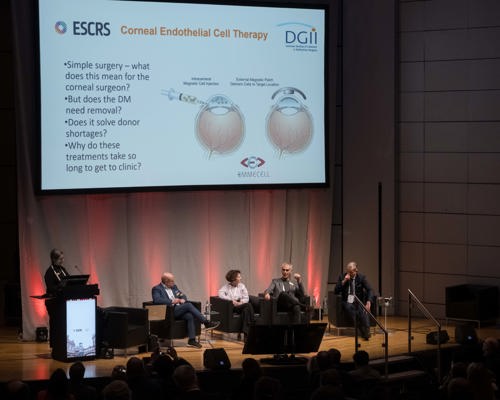Congress News, Cataract, Cornea, Glaucoma, Paediatric, Refractive, Retina, Meetings, Artificial Intelligence, Digital Operating Room
Best of ESCRS Winter Meeting 2024

Sean Henahan
Published: Monday, April 1, 2024
The two-hour long “Best of the Best” session on the final day of the ESCRS Winter Meeting in Frankfurt highlighted the wide array of innovative therapies and technical controversies in current cataract, cornea, and refractive surgery practice.
Drs Burkhard Dick, Suphi Taneri, Sorcha Ní Dhubhghaill, and Filomena Ribeiro oversaw 17 panel discussions. The all-star panels included Drs Oliver Findl, Joaquín Fernández, José Güell, Marcus Blum, Gerd Auffarth, Farhad Hafezi, Maya Mueller, Sigfried Priglinger, Claudette Abela-Formanek, Béatrice Cochener-Lamard, Thomas Kohnen, Pavel Stodůlka, Paolo Vinciguerra, Nic Reus, Ramin Khoramnia, Christopher Wirbelauer, and Durval Carvalho Jr.
One panel discussed the continuing evolution of the digital OR, including the use of digital microscopes and 3D systems for cataract surgery. Panellists discussed the potential advantages of these technologies, ranging from the back-saving ergonomic benefits of not having to stoop over the traditional operating microscope to the significant reduction in light required, a positive benefit for patients.
The 3D headset systems now becoming available offer an increasing amount of integration with various imaging systems and patient data. These systems also have incredible potential as teaching tools, where many students can don 3D goggles and watch the surgery as it happens.
Another panel on high tech discussed the current and future state of robotic cataract surgery, with a consensus that robotic-enhanced cataract surgery is not a matter of if but rather when it will become part of everyday practice. The many potential benefits include movement scaling and tremor filtering for enhanced precision, and preplanned paths to help lower the risk of “collateral damage.” Robotic systems also offer the potential for remote surgery and enable the development of new surgical instruments and methods that are not practical otherwise.
Robotics researcher Marvin Bende described how a remote system might work. Telemetry data extracted from a 3D image, supplemented with additional data sources such as OCT, would be used to adapt a digital representation of the surgical scene to the real-world situation. Inputs from the operator wearing a 3D headset would translate to robotic arm movement. Additional haptic feedback could also be provided to the operator throughout the surgery.
“I expect that in five to ten years, we will have robot-assisted cataract surgery. There will be resistance, but change is coming,” predicted Farhad Hafezi MD.

On the cornea front, panellists discussed various cell therapies now entering the clinic for treating corneal endothelial disease, including Emmecell, a novel way to treat corneal oedema now in the advanced stage of clinical trials. Magnetic cells are injected intracamerally, and then an external magnetic patch delivers the cells to the target location.
Attendees also learned about mitomycin intravascular chemoembolization (MICE), a potential treatment of visually significant corneal neovascularization. This technique is in the very early clinical stages, with promising results reported for a handful of patients. Panellists were interested, but there was some concern about quantity of mitomycin leaking into the circulation.
Other topics featured in the panel discussions included topical losartan for the inhibition of myofibroblasts, AI and keratoconus detection, and AI and phakic IOL implantation. EuroTimes will provide in-depth coverage from the ESCRS Winter Meeting in Frankfurt on these and related topics.
Latest Articles
Glaucoma Treatment Under Pressure
New techniques and technologies add to surgeons’ difficult decisions
Outside the Box, Inside the Pipeline
Researchers are tackling glaucoma diagnosis and treatment from all sides.
The EHDS Is Ready for the Green Light
If proposal is approved, Europe could see better access to, and exchange and use of, health data.
ESCRS to Release Guidelines for Cataract and Refractive Surgery
Comprehensive approach to the safest and most effective modern surgery.
Barry Fellowship Opens Up ‘Whole New Field of Thought’
The 2022 recipient combines theoretical and practical to learn new treatments.
Digitalising the OR—Experience and Perspectives
Benefits include saving time and improving outcomes.
Dynamic Measures Needed for Quality of Vision
Functional visual acuity testing and straylight metering may better reflect real-world conditions.
What Is Stopping Digital OR Adoption?
Ophthalmologists know the benefits—now it’s time to construct the right plan.
Time to Move Beyond Monofocal IOLs?
European surgeons appear hesitant to first offer other presbyopia-correcting options to patients.